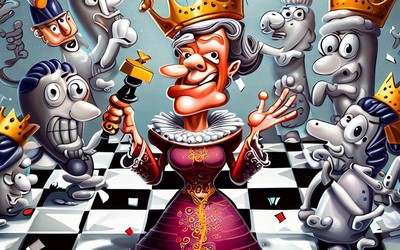
A Fascinating Journey Through Chess History
Chess, the timeless game of strategy and intellect, has captivated minds for centuries. Its origins can be traced back to ancient times, and since then, it has evolved into a worldwide phenomenon. In this blog, we embark on a captivating journey through the rich and storied history of chess, exploring its origins, development, and remarkable milestones along the way.- The Origins of Chess: To understand the history of chess, we must delve into its ancient roots. The game's origins can be traced back to the 6th century in Northern India, where it was known as "Chaturanga." From there, it spread to Persia, where it evolved into "Shatranj," a popular game among the Arab world.
- Chess in Medieval Europe: During the Middle Ages, chess made its way to Europe through the Islamic empire. It gained popularity among the nobility and became a symbol of strategic prowess. The rules underwent several transformations during this period, leading to the birth of modern chess as we know it today.
- The Renaissance and Chess: The Renaissance era saw a surge in interest in intellectual pursuits, and chess was no exception. It became a favorite pastime of scholars and thinkers, with many treatises and manuals being written on chess strategy. The era also witnessed the rise of chess prodigies and famous matches that captured public imagination.
- The Romantic Era of Chess: The 19th century marked a period of intense creativity and bold play in chess, known as the Romantic Era. Chess masters such as Paul Morphy, Adolf Anderssen, and Wilhelm Steinitz pushed the boundaries of the game, introducing new opening theories and tactical patterns.
- The World Chess Championships: The late 19th century saw the establishment of the World Chess Championship, the ultimate title in the chess world. From Wilhelm Steinitz to Magnus Carlsen, we explore the lineage of champions who held this prestigious title and their contributions to the game.
- The Soviet Chess School: The Soviet Union dominated the chess scene from the 1920s to the 1990s, producing a string of world champions and formidable players. We delve into the rise of Soviet chess, the training methods employed, and the impact it had on the game's development.
- Chess and Computers: The advent of computers brought about a new chapter in chess history. The famous match between Garry Kasparov and IBM's Deep Blue in 1997 marked a significant turning point, with artificial intelligence proving capable of defeating human world champions. We explore the subsequent advancements in chess-playing programs and their influence on the game.
- Modern Chess: A Global Phenomenon: In recent years, chess has witnessed a resurgence in popularity, fueled by online platforms and high-profile tournaments. We discuss the impact of players like Magnus Carlsen and the rise of chess as an eSport, attracting millions of players and spectators worldwide.
Conclusion: Chess, with its intricate strategies and timeless appeal, has traversed centuries, continents, and cultures. Its evolution reflects the growth of human intellect and the ever-expanding horizons of possibility. As we look back on the fascinating history of chess, we are reminded of the game's enduring legacy and its profound influence on both the intellectual and cultural landscapes. Whether you are a seasoned player or a curious observer, the captivating story of chess is one that continues to unfold with every move on the 64 squares.
Follow Me for more Blogs!
Discuss this blog post in the forum



More blog posts by Divena013

Lichess Horsey: When Knights Go Wild!
Hey there, chess enthusiasts, horse lovers, and anyone who's ever wondered why knights are often cal…
Checkmate Your Boredom: The Hilarious World of Chess
Hello there, fellow chess enthusiasts and chess-not-so-enthusiasts-but-you're-here-anyway! Today, we…
Happy Birthday Judit Polgár!
Today is the birthday of Judit Polgár!, the strongest female chess player of all time. She was born …
